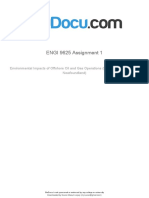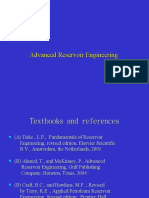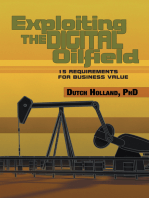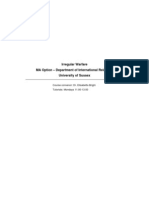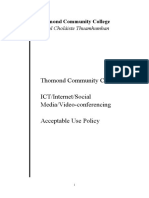EOR Course Outline
Uploaded by
Wajih HasnainEOR Course Outline
Uploaded by
Wajih HasnainFACULTY OF ENGINEERING
School of Petroleum Engineering
PTRL 4012 / 5012
Enhanced Oil and Gas Recovery
COURSE OUTLINE
SESSION 1, 2015
PTRL2019
S2-2013
Contents
1.
2.
COURSE STAFF............................................................................................................3
COURSE INFORMATION............................................................................................3
a. Course Size..................................................................................................................3
b. Course overview..........................................................................................................3
c. Aims and Learning Outcomes / Graduate Attributes..................................................3
d. Student learning outcomes..........................................................................................3
e. Teaching strategies......................................................................................................4
f. Suggested approaches to learning...............................................................................4
g. Attendance...................................................................................................................4
3. ADMINISTRATIVE MATTERS...................................................................................4
a. Expectations of Students.............................................................................................4
b. Examination procedures and advice concerning illness or misadventure...................4
c. Equity and diversity....................................................................................................5
d. Occupational Health and Safety..................................................................................5
e. Course evaluation and continual improvement...........................................................6
4. SUGGESTED STUDY SCHEDULE.............................................................................7
5. ASSESSMENT...............................................................................................................7
6. ACADEMIC HONESTY AND PLAGIARISM.............................................................8
7. RESOURCES AND SUPPORTS FOR STUDENTS.....................................................9
a. Text..............................................................................................................................9
b. Use of the web.............................................................................................................9
c. Other resources and supports......................................................................................9
PTRL2019
1.
S2-2013
COURSE STAFF
INSTRUCTOR:
Lecture: Ryan Armstrong
Office: 243 - Tyree Energy Technology Building
Email: ryan.armstrong@unsw.edu.au
Office Hours: Wed 12:30 1:30 pm, Thursday 10 11 am
Office visits must be during office hours or appointment
only.
This is a UNSW-Moodle course, so all communication outside of consultation times will
bemade through Moodle. It is strongly recommended that you check the course details
onMoodledaily so as not to miss important announcements concerning
lectures,assignments, marks, events and other related matters.
2.
COURSE INFORMATION
a
Course Size
Units of Credit: 6
b
Hours per week: 7
Course overview
Prerequisite:
PTRL 3001 Reservoir Engineering B
PRTL 3002 Reservoir Characterization and Simulation
Students who do not have this background knowledge need to consult with the lecturer.
a.
Aims and Learning Outcomes /Graduate Attributes
This course aims to introduce the student to the background knowledge in enhanced oil and
gas recovery (EOR/EGR) techniques that have been widely applied in petroleum industry
and research. The learning outcomes are for the student to (1) gain knowledge and skills
needed to solve reservoir engineering problems, (2) apply integrated knowledge of math
and basic sciences including physics, chemistry, and microbiology to the solution of
problems related to EOR/EGR performance predictions.
b.
Student learning outcomes
By successfully completing this course, you should understand:
A)
B)
C)
Petrophysical Properties Related To EOR: capillary pressure saturation curves, pore-scale
displacement, relative permeability, capillary pressure desaturation curves, wettability, ionic
exchange, and precipitation/dissolution.
Phase Behavior Related to EOR:fundamentals of phase-equilibrium, phase behavior of pure
components, phase behavior of mixtures, ternary diagrams, quantitative representation of two-phase
equilibrium.
Displacement and Sweep Efficiency: fractional flow theory, pore-scale multiphase flow,
immiscible displacement, dissipation in immiscible displacement, ideal miscible displacements,
dissipation in miscible displacements, generalization of fractional-flow theory, application to three3
PTRL2019
S2-2013
phase flow, modeling EOR processes with two-phase fractional-flow theory, areal sweep efficiency,
measures of heterogeneity, displacements with no vertical communication, vertical equilibrium,
special cases of vertical equilibrium, instability phenomena, gravity segregation in gas EOR.
D) Solvent Methods: solvent properties, solvent and crude-oil properties, solvent-water properties,
solvent phase-behavior experiments, dispersion and slug processes, two-phase flow in solvent
floods, solvent floods with viscous fingering, solvent flooding and residual oil saturation,
estimating field recovery.
E) Polymer Methods: polymer properties, profile control, polymer degradation, fractional flow in
polymer floods, elements of polymer-flood design, and field studies.
F) Surfactant Methods: surfactants and surfactant selection, surfactant/oil/bring phase behavior, nonideal effects, phase behavior and IFT, other phase properties, high-capillary-number relative
permeabilities, alkaline/surfactant flooding, surfactant formation, displacement mechanisms, rockfluid interactions, fractional-flow theory in SP and ASP floods, typical production responses, and
designing SP/ASP floods.
G) Thermal Methods: physical properties, fractional flow in thermal displacement, heat losses from
equipment and wellbores, heat losses to over-burden and under-burden, steam-drives, steam soak,
in-situ combustion, and SAGD.
H) Foam Enhanced Oil Recovery: nature of foam in permeable media, mobility of gas and water in
foam, strong foams in two regimes, foam propagation, effect of oil and wettability on foam,
modeling foam flow: mechanistic foam models, and modeling foam Flow: local steady-state
models.
I) Microbial Enhanced Oil Recovery: displacement mechanisms, microbial reservoir ecology,
microbial growth models, bioclogging, wettability effect, biosurfactant production, sulfate
reduction.
c.
Learning and Teaching Strategies
The teaching approach to be employed will involve lectures and tutorials. Lecture
presentations cover theoretical and practical aspects, which are also described in the
supporting academic texts and teaching resources. A series of in-class exercises will be
employed to reinforce and build upon the concepts introduced during the lectures. You are
encouraged to ask questions and express feedback during classes. You are expected to read
prescribed materials in advance of classes to enable active participation.
d.
Suggested approaches to learning
As a guide, 1 UOC equates to approximately 30 hours of work per session, including
lectures, tutorials and private study. This course is worth 6 UOC, corresponding to 15
hours of work per week. Lectures and class meetings take 5 hours per week, leaving 9
hours per week for individual reading, research and working on problems. In periods
where you need to complete assignments or prepare for examinations, the workload may
be greater. You should take the required workload into account when planning how to
balance study with employment and other activities.
e.
Attendance
To pass this course it is expected that you will attend at least 80% of tutorials and lectures.
If your attendance is below 80% you will not be admitted to the final exam . Attendance
will be recorded when applicable. Normally, there is no make-up work for poor attendance.
If you have misadventure or ill-health, please speak with me as soon as possible. The
attendance requirement is not meant to be punitive. It is included because participation is
an important part of achieving the course outcomes.
3.
ADMINISTRATIVE MATTERS
4
PTRL2019
S2-2013
Take time to review the documentation on processes and procedures that you will have
received at enrolment and from your School. If School documentation is not available, the
UNSW-eLearningsite has Administrative Matters documentation for this course.
a
Expectations of Students
UNSW expects regular attendance at lectures and tutorials/laboratory classes/seminars.
Although exceptions may be made for special circumstances, we do expect University
commitments to take precedence over regular work activities, holidays etc.
UNSW has rules for computer use, for example, for email and online discussion forums.
You will have to agree to them when you first access the UNSW network.
We expect everyone staff and students to treat each other with respect.
b
Examination procedures and advice concerning illness or misadventure
If you believe that your performance in one of the assessment components for the course
has been significantly affected by illness or other unexpected circumstance, then you
should make an application for special consideration as soon as possible after the event by
visiting UNSW Student Central.
Applying for special consideration does not mean that you will be granted additional
assessment or that you will be awarded an amended result. The latter will be granted at the
discretion of teaching staff and will be considered only in exceptional circumstances. The
timing of any additional assessment is entirely at the discretion of teaching staff.
For additional clarification 1. Students who do not attend a written examination will fail unless they have a valid
doctors certificate proving that they are ill at the time of the examination.
2. Students who attend a written examination, but who fall ill during the examination will
be assessed on the examination paper they submit unless they have a valid doctors
certificate proving that they are ill at the time of that examination.
3. In the case of illness, the doctors certificate must be handed to the Student Centre and
copied to the course authority no later than 3 days after the date of the written examination.
4. If a student can prove illness with a doctors certificate, in extreme cases only the course
authority might give special consideration and arrange another examination before the
following UNSW semester. In such cases, the course authority either will arrange another
written examination or alternatively will arrange an oral examination attended by 2 or 3
academics. Whether or not the course authority arranges another examination and the form
and timing of such an arrangement are entirely at the discretion of the course authority,
whose decision is final.
5. The School keeps a register of special consideration applications. The history of a
students previous applications for special consideration is taken into account when
considering each case.
6. If special consideration is granted, the course authority will assess a student based on the
final examination and not any previous examination paper that the student might have
submitted (see 2 above).
PTRL2019
S2-2013
Equity and diversity
Those students who have a disability that requires some adjustment in their teaching or
learning environment are encouraged to discuss their study needs with the course convener
prior to, or at the commencement of, their course, or with the Equity Officer (Disability) in
the Equity and Diversity Unit (9385 4734 or http://www.studentequity.unsw.edu.au/).
Issues to be discussed may include access to materials, signers or note-takers, the provision
of services and additional exam and assessment arrangements. Early notification is
essential to enable any necessary adjustments to be made.
d
Occupational Health and Safety
Like the wider community, UNSW has strict policies and expectations on Occupational
Health and Safety and you should read these. They may be accessed on:
http://www.ohs.unsw.edu.au/ohs_policies/index.html
f.
Course evaluation and continual improvement
You will have opportunities to shape future development of this course quite substantially
via formal and informal course evaluation. I ask that you do this constructively, for the
benefits of subsequent years students. Your responses will not be used in any way other
than to provide inputs into improving this course. Your opinions really do make a
difference. I take your feedback and evaluation very seriously and seek to modify the
course in response to widely supported suggestions.
PTRL2019
4.
S2-2013
COURSE SCHEDULE
A) Reservoir Rock and Fluid Properties
Lecture 1 Wednesday (10 am12 pm)
Lecture 2 Tuesday (4 pm6 pm)
Location: Colombo B
Location: Ritchie Theatre
4 - March
3 - March
Introduction and Overview
No Tutorial
11 - March
10 - March
Petrophysical Properties Related to EOR
What is EOR? Production Decline
18 - March
17 - March
Phase Behaviour Related to EOR
Petrophysical Properties Related to EOR
25 - March
24 - March
Displacement Efficiency
Phase Behaviour Related to EOR
1 - April
30 - March
Sweep Efficiency
Displacement Efficiency
15 - April
14 - April
Solvent Methods
Sweep Efficiency
22 - April
21 - April
Midterm Exam
No Tutorial (Lecturer will be available for exam related
question)
29 - April
28 April
Polymer Methods
Solvent Methods / PG Presentation
6 - May
5 - May
Surfactant Methods
Polymer Methods / PG Presentation
13 - May
12 - May
Week
9
10
PTRL2019
S2-2013
Thermal Methods
Surfactant Methods / PG Presentation
20 - May
19 - May
Foam Enhanced Oil Recovery / PG
Presentations
Thermal Methods / PG Presentation
27 - May
26 - May
12
Microbial Enhanced Oil Recovery / PG
Presentations
Foam Enhanced Oil Recovery / PG Presentation
13
3 - June
2 - June
No Lecture
Microbial Enhanced Oil Recovery / PG Presentation
11
Final Exam Period is 12- 29 June, exact data TBD.
5.
ASSESSMENT
The table below gives details of each assignment task and its subcomponents, whether it is
individual or teamwork, and the assessment criteria. Feedback will be given for each
submission. Late submissions will not be accepted.In team assignments, the contribution of
each member must be clearly stated.
Midterm Exam: one midterm exam will be given during the normal lecture period. The
scheduled date of this exam is 22 April. However the date may change depending on the
progress of the lectures. It is the responsibility of the student to attend lecture and note any
changes to the exam date.
Assignments are given periodically (approximately 1 per major topic of study) and the due
data will be announced when the assignment is given. Assignment Submissionswill NOT
be accepted after the due date.
Participation is evaluated by attendance, which will be taken randomly during the
semester.
VERY IMPORTANT NOTICE
You must attend a minimum of 80% of all lectures/tutorials in order to be admitted to
the final exam of this course
Final Exam: will be given outside of the normal lecture schedule. More details will be
provided towards the end of the semester.
*Post-Graduate Project: groups of 5-6 students will conduct a research project on a given
EOR/IOR technique that is related to the lecture material. The project will be evaluated
through a 20-minute presentation given to the class during week 11 or 12. Details of the
evaluation will be given at a latter date.
PTRL2019
S2-2013
Task
Due
Date
Week Due
Marks
Midterm Exam
22
April
30
Assignments
TBD
TBD
10
Participation
10
Final Exam
TBD
TBD
50
Post-Graduate Project*
TBD
TBD
15
*pg, post- graduate students only.
IMPORTANT NOTICE
If you do not attend the midterm and/or the final exam on the date and time assigned
for the exam, justified or not justified, you will have to present an ORAL exam,
instead, in front of two members of the academic staff. The same rule will apply if you
are allowed to re-sit the exam in case of failure in the first attempt.
PTRL2019
S2-2013
1 ACADEMIC HONESTY AND PLAGIARISM
What is Plagiarism?
Plagiarism is the presentation of the thoughts or work of another as ones own.* Examples include:
direct duplication of the thoughts or work of another, including by copying material, ideas or
concepts from a book, article, report or other written document (whether published or
unpublished), composition, artwork, design, drawing, circuitry, computer program or software,
web site, Internet, other electronic resource, or another persons assignment without
appropriate acknowledgement;
paraphrasing another persons work with very minor changes keeping the meaning, form and/or
progression of ideas of the original;
piecing together sections of the work of others into a new whole;
presenting an assessment item as independent work when it has been produced in whole or part
in collusion with other people, for example, another student or a tutor; and
claiming credit for a proportion a work contributed to a group assessment item that is greater
than that actually contributed.
For the purposes of this policy, submitting an assessment item that has already been submitted for
academic credit elsewhere may be considered plagiarism.
Knowingly permitting your work to be copied by another student may also be considered to be
plagiarism.
Note that an assessment item produced in oral, not written, form, or involving live presentation,
may similarly contain plagiarised material.
The inclusion of the thoughts or work of another with attribution appropriate to the academic
discipline does not amount to plagiarism.
The Learning Centre website is main repository for resources for staff and students on
plagiarism and academic honesty. These resources can be located via:
www.lc.unsw.edu.au/plagiarism
The Learning Centre also provides substantial educational written materials, workshops, and
tutorials to aid students, for example, in:
correct referencing practices;
paraphrasing, summarising, essay writing, and time management;
appropriate use of, and attribution for, a range of materials including text, images, formulae and
concepts.
Individual assistance is available on request from The Learning Centre.
Students are also reminded that careful time management is an important part of study and one
of the identified causes of plagiarism is poor time management. Students should allow sufficient
time for research, drafting, and the proper referencing of sources in preparing all assessment items.
* Based on that proposed to the University of Newcastle by the St James Ethics Centre.
Used with kind permission from the University
of Newcastle
Adapted with kind permission from the University of Melbourne.
10
PTRL2019
7.
S2-2013
RESOURCES AND SUPPORTS FOR STUDENTS
This course is based on the philosophy that as students you achieve superior academic
skills when you are required to demonstrate initiative and seek your own readings. The
following materials are a few sources you can use for gathering the latest research evidence
and theoretical propositions to help you in this course:
a
Recommended Reading
1.
Enhanced Oil Recovery, Larry W. Lake, Prentice Hall, 1996, ISBN 978 01328160143.
2.
Fundamentals of Reservoir Engineering, L.P. Dake, Developments in Petroleum Science 8,
1978, Elsevier Science, ISBN 0-444-41830.
3.
Thermal Recovery, Michael Prats, SPE Henry L. Doherty Textbook Series Vol.7, 1985,
ISBN 9780895203250.
4.
Other readings will be posted on Moodle.
g.
Discipline-specific WWW Resources
www.appea.com.au
www.pesa.com.au www.spe.org www.api.org
(The Australian Petroleum Production and Exploration Association)
(The Petroleum Exploration Society of Australia)(Society of Petroleum Engineers)
(American Petroleum Institute For Petroleum Standards)
Students seeking resources can also obtain assistance from the UNSW Library. One
starting point for assistance is:
info.library.unsw.edu.au/web/services/services.html
h.
Other resources and supports
The University and the Faculty provide a wide range of support services for students,
including:
UNSW Learning Centre (http://www.lc.unsw.edu.au)
Counselling support - http://www.counselling.unsw.edu.au
Library training and support services - http://www.library.unsw.edu.au/
OnePetro (http://www.onepetro.org)
11
You might also like
- The Reservoir Engineering Aspects of WaterfloodingNo ratings yetThe Reservoir Engineering Aspects of Waterflooding142 pages
- Brill, J. P. and Mukherjee, H. - Multiphase Flow in WellsNo ratings yetBrill, J. P. and Mukherjee, H. - Multiphase Flow in Wells149 pages
- Formation Testing: Pressure Transient and Contamination AnalysisFrom EverandFormation Testing: Pressure Transient and Contamination AnalysisNo ratings yet
- Water Flooding: College of Oil and Gas EngineeringNo ratings yetWater Flooding: College of Oil and Gas Engineering25 pages
- Fluid Flow in Petroleum Reservoirs - Content PDFNo ratings yetFluid Flow in Petroleum Reservoirs - Content PDF11 pages
- 3 - The Impact of The Reservoir On The Field Scaling ProblemNo ratings yet3 - The Impact of The Reservoir On The Field Scaling Problem53 pages
- 1971 SPE2603 Fetkovich Simplified Water Influx MB PDFNo ratings yet1971 SPE2603 Fetkovich Simplified Water Influx MB PDF15 pages
- Exercise 1: Matrix-Fracture Transfer Estimation in A Transient Well TestNo ratings yetExercise 1: Matrix-Fracture Transfer Estimation in A Transient Well Test10 pages
- Applications of Differential Equations in Petroleum EngineeringNo ratings yetApplications of Differential Equations in Petroleum Engineering5 pages
- Donaldson Erle Enhanced Oil Recovery I Fundamentals and AnalysesNo ratings yetDonaldson Erle Enhanced Oil Recovery I Fundamentals and Analyses366 pages
- Complete Download Petroleum Reservoir Modeling and Simulation. Geology, Geostatistics, and Performance Reduction Sanjay Srinivasan PDF All Chapters100% (1)Complete Download Petroleum Reservoir Modeling and Simulation. Geology, Geostatistics, and Performance Reduction Sanjay Srinivasan PDF All Chapters76 pages
- Principles of Formation Evaluation (PGE358)No ratings yetPrinciples of Formation Evaluation (PGE358)18 pages
- (PTRL14H03) Model Answer Reservoir Management100% (1)(PTRL14H03) Model Answer Reservoir Management9 pages
- Reservoir Rock Properties and Fluid FlowNo ratings yetReservoir Rock Properties and Fluid Flow2 pages
- Production Prediction of Hydraulically Fractured Reservoirs Based On Material Balances v1No ratings yetProduction Prediction of Hydraulically Fractured Reservoirs Based On Material Balances v131 pages
- Build A Mode Lfrom Scratch in Petrel - 1No ratings yetBuild A Mode Lfrom Scratch in Petrel - 115 pages
- IC - Introduction To Petroleum GeoscienceNo ratings yetIC - Introduction To Petroleum Geoscience323 pages
- Course:-28117 Class: - 289033a: Section I Well Performance Evaluation Section II Completion Design100% (2)Course:-28117 Class: - 289033a: Section I Well Performance Evaluation Section II Completion Design13 pages
- Numerical Simulation in Reservoir ModelingNo ratings yetNumerical Simulation in Reservoir Modeling9 pages
- Formation Testing: Supercharge, Pressure Testing, and Contamination ModelsFrom EverandFormation Testing: Supercharge, Pressure Testing, and Contamination ModelsNo ratings yet
- Advanced Petroleum Reservoir Simulation: Towards Developing Reservoir EmulatorsFrom EverandAdvanced Petroleum Reservoir Simulation: Towards Developing Reservoir EmulatorsNo ratings yet
- Exploiting the Digital Oilfield: 15 Requirements for Business ValueFrom EverandExploiting the Digital Oilfield: 15 Requirements for Business Value5/5 (1)
- Wave Propagation in Drilling, Well Logging and Reservoir ApplicationsFrom EverandWave Propagation in Drilling, Well Logging and Reservoir ApplicationsNo ratings yet
- 2 - Machining Processes and Machine ToolsNo ratings yet2 - Machining Processes and Machine Tools69 pages
- Course Outline (Manufacturing Process II)No ratings yetCourse Outline (Manufacturing Process II)36 pages
- Conversation On AI, Chatbots, and Plagiarism in Higher EducNo ratings yetConversation On AI, Chatbots, and Plagiarism in Higher Educ2 pages
- ICT, Internet & Social Media Expected Use Policy 2020No ratings yetICT, Internet & Social Media Expected Use Policy 20207 pages
- Assignment (100%) : ESE 633 Statistics in Education0% (1)Assignment (100%) : ESE 633 Statistics in Education13 pages
- APA Guide To Referencing W20-Final - Mount RoyalNo ratings yetAPA Guide To Referencing W20-Final - Mount Royal12 pages
- Activity Guide and Evaluation Rubric - Unit 3 -Task 3 - Markovian decision processes (1)No ratings yetActivity Guide and Evaluation Rubric - Unit 3 -Task 3 - Markovian decision processes (1)12 pages
- FINS3616 International Business Finance: School of Banking and FinanceNo ratings yetFINS3616 International Business Finance: School of Banking and Finance16 pages
- Activity Guide and Evaluation Rubric - Unit 1 - Task 1 - Introduction To The Didactics of MathematicsNo ratings yetActivity Guide and Evaluation Rubric - Unit 1 - Task 1 - Introduction To The Didactics of Mathematics5 pages
- GR 11 TOURISM PAT PHASE 1 2024 TEMPLATENo ratings yetGR 11 TOURISM PAT PHASE 1 2024 TEMPLATE16 pages
- The Reservoir Engineering Aspects of WaterfloodingThe Reservoir Engineering Aspects of Waterflooding
- Brill, J. P. and Mukherjee, H. - Multiphase Flow in WellsBrill, J. P. and Mukherjee, H. - Multiphase Flow in Wells
- Formation Testing: Pressure Transient and Contamination AnalysisFrom EverandFormation Testing: Pressure Transient and Contamination Analysis
- Water Flooding: College of Oil and Gas EngineeringWater Flooding: College of Oil and Gas Engineering
- 3 - The Impact of The Reservoir On The Field Scaling Problem3 - The Impact of The Reservoir On The Field Scaling Problem
- 1971 SPE2603 Fetkovich Simplified Water Influx MB PDF1971 SPE2603 Fetkovich Simplified Water Influx MB PDF
- Exercise 1: Matrix-Fracture Transfer Estimation in A Transient Well TestExercise 1: Matrix-Fracture Transfer Estimation in A Transient Well Test
- Applications of Differential Equations in Petroleum EngineeringApplications of Differential Equations in Petroleum Engineering
- Donaldson Erle Enhanced Oil Recovery I Fundamentals and AnalysesDonaldson Erle Enhanced Oil Recovery I Fundamentals and Analyses
- Complete Download Petroleum Reservoir Modeling and Simulation. Geology, Geostatistics, and Performance Reduction Sanjay Srinivasan PDF All ChaptersComplete Download Petroleum Reservoir Modeling and Simulation. Geology, Geostatistics, and Performance Reduction Sanjay Srinivasan PDF All Chapters
- Production Prediction of Hydraulically Fractured Reservoirs Based On Material Balances v1Production Prediction of Hydraulically Fractured Reservoirs Based On Material Balances v1
- Course:-28117 Class: - 289033a: Section I Well Performance Evaluation Section II Completion DesignCourse:-28117 Class: - 289033a: Section I Well Performance Evaluation Section II Completion Design
- Formation Testing: Supercharge, Pressure Testing, and Contamination ModelsFrom EverandFormation Testing: Supercharge, Pressure Testing, and Contamination Models
- Advanced Petroleum Reservoir Simulation: Towards Developing Reservoir EmulatorsFrom EverandAdvanced Petroleum Reservoir Simulation: Towards Developing Reservoir Emulators
- Exploiting the Digital Oilfield: 15 Requirements for Business ValueFrom EverandExploiting the Digital Oilfield: 15 Requirements for Business Value
- Wave Propagation in Drilling, Well Logging and Reservoir ApplicationsFrom EverandWave Propagation in Drilling, Well Logging and Reservoir Applications
- Conversation On AI, Chatbots, and Plagiarism in Higher EducConversation On AI, Chatbots, and Plagiarism in Higher Educ
- ICT, Internet & Social Media Expected Use Policy 2020ICT, Internet & Social Media Expected Use Policy 2020
- Assignment (100%) : ESE 633 Statistics in EducationAssignment (100%) : ESE 633 Statistics in Education
- Activity Guide and Evaluation Rubric - Unit 3 -Task 3 - Markovian decision processes (1)Activity Guide and Evaluation Rubric - Unit 3 -Task 3 - Markovian decision processes (1)
- FINS3616 International Business Finance: School of Banking and FinanceFINS3616 International Business Finance: School of Banking and Finance
- Activity Guide and Evaluation Rubric - Unit 1 - Task 1 - Introduction To The Didactics of MathematicsActivity Guide and Evaluation Rubric - Unit 1 - Task 1 - Introduction To The Didactics of Mathematics

















